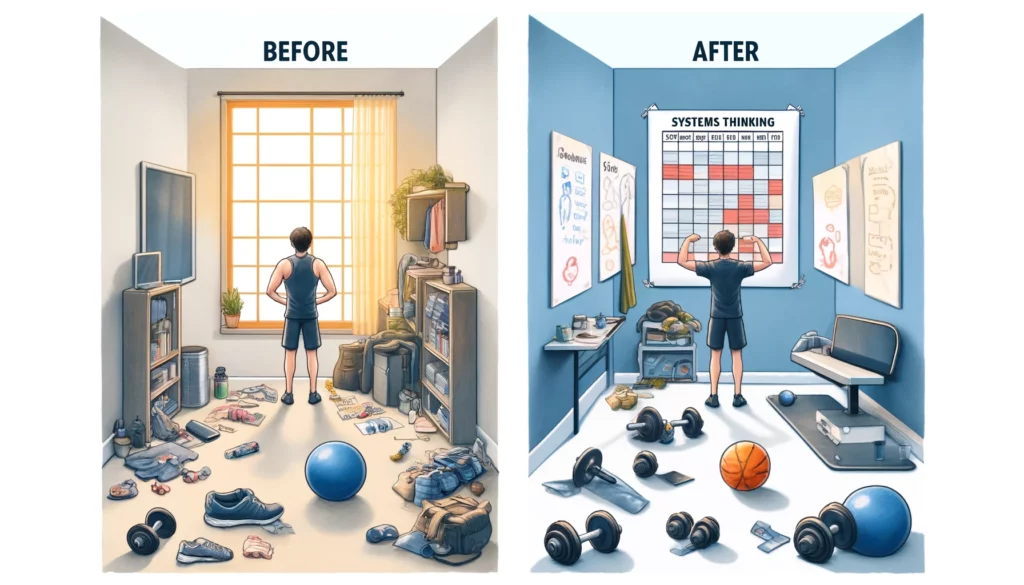Hey everyone, Stephen here 😊. Let me introduce you to ‘Systems Thinking for Personal Development’ – One concept that has given me and my clients a lot of success.
Ever find yourself pumped about a new goal, only to see that motivation fizzle out in a matter of weeks? Even with my experience as a life coach and knowledge of human psychology, I still get caught in that same cycle sometimes!
Does this sound familiar? You set a sparkly new goal, get all fired up, and then a few days later… nothing. Excitement vanished. Back to square one.
Well, you’re not alone (there are at least two of us!), and, luckily there’s a smarter way to approach personal development, and it doesn’t rely on fleeting motivation. Let me introduce you to a concept called ‘Systems Thinking’ – which I promise is not as complicated as it sounds. Let’s dive in.
What Is ‘Systems Thinking’?
Systems thinking is stepping back and looking at the bigger picture. Instead of focusing on individual tasks or goals, you create a system that naturally leads to success. Think of it as designing your environment and habits to work for you, not against you.
All-around clever business bloke (to use his full title) Dr. W. E. Deming stated that “Every system is perfectly designed to get the result that it does”.
Now Deming was talking about business, but this approach isn’t just for engineers or business strategists; it’s a game-changer for personal development too. Let’s explore how we can apply it.
Why Motivation Isn’t Enough
Motivation is a sugar rush. It feels great at the start, but it doesn’t last. According to habit hero James Clear, author of “Atomic Habits”, relying solely on motivation is like running on a treadmill: you’re expending energy but not necessarily getting anywhere. The key to improving is to create a sustainable system that keeps us on track even when our initial enthusiasm wanes.

The Importance of Systems
Imagine trying to grow a garden without setting up proper irrigation or choosing the right plants for your soil. You’d be frustrated with the lack of results, right? The same goes for personal development. Without the right systems in place, we’re setting ourselves up for failure. Systems thinking helps us focus on the processes and routines that lead to achieving our goals, making success almost inevitable.
Personal Story: My Shift to Systems Thinking for Personal Development
A few years months hours ago, I was struggling to stick to a fitness routine. I’d start strong, but my motivation would dip, and I’d skip workouts. Then, I discovered systems thinking. Instead of relying on motivation, I created a system: I set up my workout clothes the night before, scheduled workouts at a consistent time, and (because I’m a sucker for peer pressure) I found a workout buddy. This system made it easier to stick to my routine, and I started seeing real progress.
Practical Steps to Implement Systems Thinking for Personal Development
- 📌 Identify Your Goals: Start with clear, specific goals. What do you want to achieve?
- 📝 Break Down the Process: Identify the steps needed to reach your goals.
- 🗓️ Create a Routine: Design a daily or weekly routine that incorporates these steps.
- 🛠️ Set Up Your Environment: Arrange your environment to support your routine. For example, keep healthy snacks visible if you’re trying to eat better.
- 📊 Track Your Progress: Use a journal or app to monitor your progress and make adjustments as needed.
Overcoming Common Challenges
Transitioning to systems thinking can be tough. You might miss the instant gratification that comes with initial motivation. But remember, systems thinking is about the long game. I’ve spoken about Mindset Maestro Dr Carol Dweck in my blog previously. She emphasises the importance of a growth mindset – believing that abilities can develop through dedication and hard work. When setbacks happen, see them as part of the process and learn from them.
The Positive Impact of Systems Thinking for Personal Development
When I embraced systems thinking, the benefits were incredible. I wasn’t just more consistent with my workouts; I felt less stressed and more in control of my life. Instead of feeling bad and chastising myself for not working out, I started to view it as an experiment. Instead reacting more along the lines of: “Well that didn’t work, I clearly haven’t figured out the right system yet… let’s tweak a few things”.
Systems thinking doesn’t just help you achieve your goals; it creates a structure that supports ongoing growth and improvement.
Conclusion
So, if you’re tired of relying on motivation and ready to see real, lasting change, it’s time to embrace systems thinking. Set up your environment, create supportive routines, and watch as your goals become achievable milestones. What systems can you implement today to move closer to your goals?
Share your thoughts in the comments below or book a session to learn more about how systems thinking can transform your life. Looking forward to hearing from you!
See you next time,
Stephen
| If you’re interested in personal development and self-improvement, why not sign up for my weekly(ish) newsletter where you’ll find practical tips and join a budding community of improvers! |
